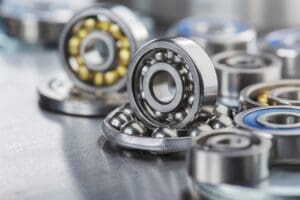Bearings are essential to modern engineering and play a crucial role across industries, enabling machinery to operate smoothly, reducing friction, and extending equipment longevity.
In 2024, advancements in bearing technology continue to push the boundaries of what’s possible, meeting the increasing demands for precision, efficiency, and reliability. From transportation to medical devices, bearings are at the core of transformative applications that define industrial progress. This article explores nine top bearings applications transforming key industries and highlights how bearing innovations are shaping the future.
1. Automotive Industry: Ball Bearings in Electric Vehicles
The automotive sector has been a major user of bearing technology, and with the rise of electric vehicles (EVs), the role of bearings has expanded. Ball bearings, for instance, are essential for the efficiency of electric drivetrains, minimizing energy loss due to friction. They are designed to withstand high-speed rotations and reduce resistance, directly impacting the range and performance of EVs. For more on cutting-edge developments, a reputable ball bearing manufacturer provides insights into high-quality bearings that serve these growing automotive needs.
2. Aerospace Industry: Turbocharger Bearings
In aerospace, precision and durability are non-negotiable. Turbocharger bearings are vital components that support the high-speed rotation of turbochargers used in aircraft engines, improving efficiency and performance at high altitudes. Turbocharger bearings are specifically engineered to handle extreme heat and pressure conditions, ensuring engine reliability and longevity. As aerospace manufacturers strive for more fuel-efficient engines, turbocharger bearings are increasingly in demand for their ability to withstand harsh conditions and enhance performance.
3. Medical Equipment: Miniature Bearings for Diagnostic Devices
Medical equipment often requires components that are compact yet reliable. Miniature bearings are integral to devices such as MRI machines, X-ray machines, and laboratory diagnostic equipment. These bearings provide the precision and stability needed for diagnostic imaging and testing, ensuring accuracy and efficiency in medical assessments. As healthcare continues to advance with minimally invasive procedures and robotics, miniature bearings are key to enhancing the functionality and dependability of medical devices.
4. Renewable Energy: Bearings for Wind Turbines
As the world shifts toward renewable energy, the demand for durable bearings in wind turbines has surged. Bearings in these turbines must withstand extreme weather conditions and continuous rotations over extended periods. Wind turbine bearings play a critical role in enabling smooth rotor movement and reducing energy loss, which contributes to the overall efficiency of energy production. With the rise of green technology, advanced bearings designed specifically for renewable energy applications are transforming the sector.
5. Railway and Transportation: Spherical Roller Bearings
Railways are among the oldest sectors relying on bearing technology, and spherical roller bearings are the backbone of modern train designs. These are engineered to handle heavy loads and maintain stability even under extreme weight and variable speeds. In 2024, advancements in spherical roller bearing technology will contribute to smoother, safer railway operations, supporting high-speed rail systems and improving the efficiency of freight and passenger transport alike.
6. Agriculture: Sealed Bearings in Heavy Machinery
Agricultural machinery operates in challenging conditions, including exposure to dirt, moisture, and debris. Bearings used in equipment like tractors and combine harvesters must be robust and resilient to these harsh environments. Sealed bearings offer protection against contaminants, ensuring machinery operates smoothly and with minimal maintenance. In 2024, the agricultural industry will adopt more of these bearings to enhance durability and performance, thereby reducing downtime and increasing productivity.
7. Construction Industry: Self-Lubricating Bearings
Excavators, cranes, and bulldozers rely on self-lubricating bearings to function in demanding environments. These element bearings, especially radial bearings, are designed to minimize maintenance needs by providing a continuous lubrication source, even in extreme conditions. Self-lubricating bearings help extend the lifespan of construction machinery, making them ideal for the high demands of the construction sector. With growing project scales, spherical roller bearings and tapered roller bearings also play essential roles, ensuring operational efficiency and reducing wear and tear.
8. Industrial Robotics: Precision Bearings for Automation
The industrial robots market is anticipated to expand from USD 16.89 billion in 2024 to USD 29.43 billion by 2029. The rise of industrial robotics has increased the need for precision bearings like thrust roller bearings and needle roller bearings, which support high accuracy and speed for automation. These bearings allow robotic arms to move smoothly and maintain precise positions, essential for tasks like assembly, packaging, and quality control. With roller thrust bearings and magnetic bearings, robotics can operate with minimized friction, enabling faster and more accurate movements. As automation advances, precision bearings in robotics are essential to ensure reliability and efficiency in various industrial applications.
9. Marine Industry: Corrosion-Resistant Bearings for Underwater Applications
In the marine industry, equipment and vessels constantly face saltwater exposure, making corrosion-resistant bearings a necessity. Stainless steel bearings and thrust ball bearings protect marine equipment like pumps and rudders from salt-induced degradation. These bearings, made from stainless steel and ceramics, ensure durability in harsh marine environments, helping extend equipment lifespans and reduce maintenance costs. Groove and deep groove ball bearings are also frequently used in these underwater applications, providing the resilience needed for reliability in marine operations.
Final Thoughts
Bearings are crucial components across numerous industries, advancing performance, efficiency, and durability. From angular contact ball bearings in medical devices to cylindrical roller bearings in wind turbines, bearings are central to industrial evolution. The varied applications of bearings, whether in electric vehicles or marine vessels, demonstrate their role in meeting modern challenges. As industries continue to innovate, thrust bearings and industrial applications of different bearing types are reshaping sectors to support a sustainable future.
